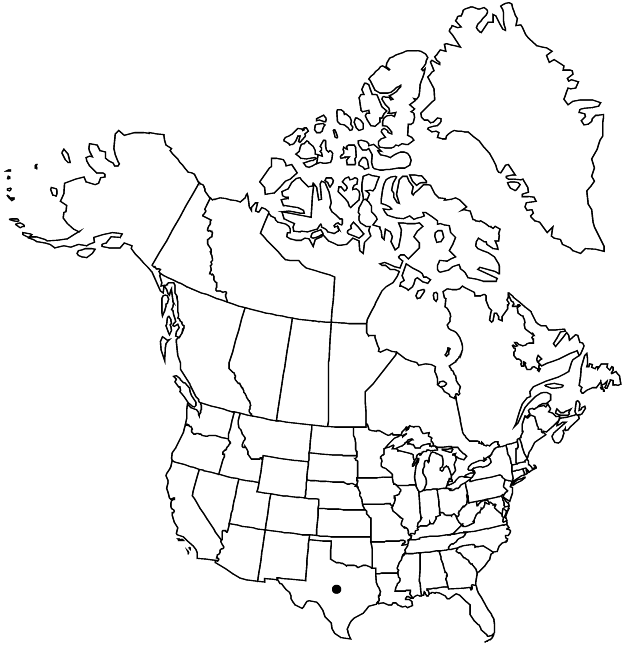Difference between revisions of "Eriogonum multiflorum var. riograndis"
Harvard Pap. Bot. 9: 184. 2004.
FNA>Volume Importer |
FNA>Volume Importer |
||
| Line 8: | Line 8: | ||
}} | }} | ||
|common_names=Rio Grande wild buckwheat | |common_names=Rio Grande wild buckwheat | ||
| − | |basionyms={{Treatment/ID/ | + | |basionyms={{Treatment/ID/Basionym |
|name=Eriogonum riograndis | |name=Eriogonum riograndis | ||
|authority=G. L. Nesom | |authority=G. L. Nesom | ||
| + | |publication_title=Sida | ||
| + | |publication_place=20: 32, fig. 1. 2003 | ||
}} | }} | ||
|synonyms= | |synonyms= | ||
| Line 28: | Line 30: | ||
|distribution=Tex. | |distribution=Tex. | ||
|discussion=<p>Variety riograndis is mostly infrequent and widely scattered in central southern Texas (Aransas, Brooks, Calhoun, Cameron, Duval, Hidalgo, Jim Hogg, Jim Wells, Karnes, Kenedy, Kleberg, Nueces, Refugio, San Patricio, Webb, Willacy, Wilson, and Zapata counties), becoming common only near the coast.</p><!-- | |discussion=<p>Variety riograndis is mostly infrequent and widely scattered in central southern Texas (Aransas, Brooks, Calhoun, Cameron, Duval, Hidalgo, Jim Hogg, Jim Wells, Karnes, Kenedy, Kleberg, Nueces, Refugio, San Patricio, Webb, Willacy, Wilson, and Zapata counties), becoming common only near the coast.</p><!-- | ||
| − | --><p>Variety riograndis is found just to the west and south of <i></i>var.<i> multiflorum</i>, and a series of overlapping (and intergrading) populations occurs along their shared boundary. Plants immediately along the coast of Texas often have thickened, almost crassulate leaf blades.</p> | + | --><p>Variety riograndis is found just to the west and south of <i></i></i>var.<i><i> multiflorum</i>, and a series of overlapping (and intergrading) populations occurs along their shared boundary. Plants immediately along the coast of Texas often have thickened, almost crassulate leaf blades.</p> |
|tables= | |tables= | ||
|references= | |references= | ||
| Line 52: | Line 54: | ||
|publication year=2004 | |publication year=2004 | ||
|special status= | |special status= | ||
| − | |source xml=https://jpend@bitbucket.org/aafc-mbb/fna-data-curation.git/src/ | + | |source xml=https://jpend@bitbucket.org/aafc-mbb/fna-data-curation.git/src/f6b125a955440c0872999024f038d74684f65921/coarse_grained_fna_xml/V5/V5_663.xml |
|subfamily=Polygonaceae subfam. Eriogonoideae | |subfamily=Polygonaceae subfam. Eriogonoideae | ||
|genus=Eriogonum | |genus=Eriogonum | ||
Revision as of 20:09, 24 September 2019
Leaf blades oblong to narrowly ovate, 1.5–4(–4.5) × 1–2.2(–2.5) cm, floccose to glabrate adaxially, occasionally thickened, auriculate-subclasping proximally.
Phenology: Flowering Aug–Nov.
Habitat: Sandy to gravelly flats and slopes, mixed grassland and mesquite communities, oak and conifer woodlands
Elevation: 0-300 m
Discussion
Variety riograndis is mostly infrequent and widely scattered in central southern Texas (Aransas, Brooks, Calhoun, Cameron, Duval, Hidalgo, Jim Hogg, Jim Wells, Karnes, Kenedy, Kleberg, Nueces, Refugio, San Patricio, Webb, Willacy, Wilson, and Zapata counties), becoming common only near the coast.
Variety riograndis is found just to the west and south of var. multiflorum, and a series of overlapping (and intergrading) populations occurs along their shared boundary. Plants immediately along the coast of Texas often have thickened, almost crassulate leaf blades.
Selected References
None.
